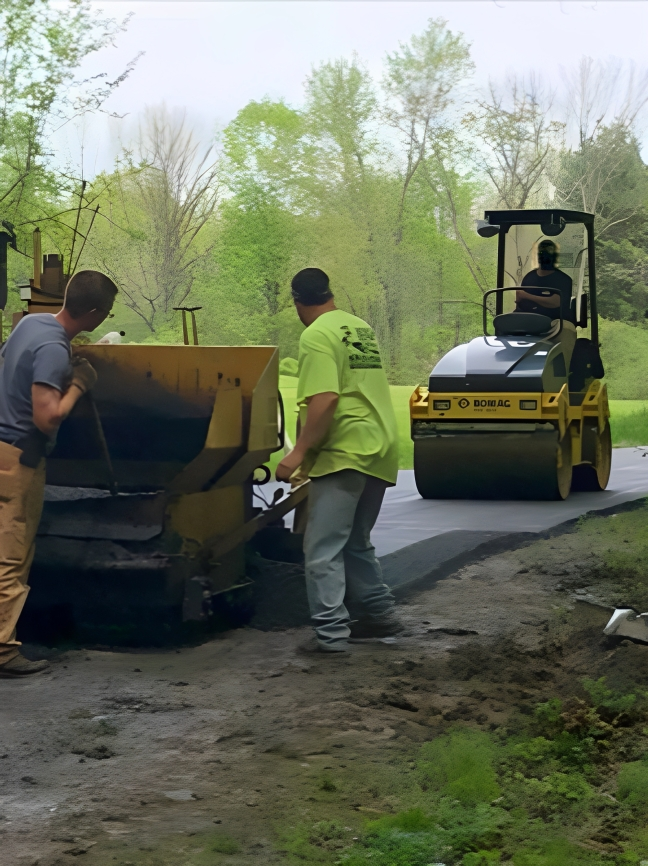ASPHALT RESURFACING IN JEFFERSON TOWNSHIP, PENNSYLVANIA
At
NEPA Asphalt, we offer professional asphalt resurfacing services designed to revitalize your worn-out pavement and restore it to its former glory. Over time, asphalt surfaces can deteriorate due to harsh weather conditions, heavy traffic, and natural aging. Our asphalt resurfacing service is a cost-effective solution that involves applying a new layer of asphalt over the existing one. Whether you have a commercial parking lot or a residential driveway in need of resurfacing, our team of experts brings the required expertise and cutting-edge equipment.
BENEFITS OF ASPHALT RESURFACING
Cost-Effective
Cost-Effective: Asphalt resurfacing is a budget-friendly alternative to full pavement replacement.
Improved Aesthetics
A newly resurfaced asphalt surface looks sleek and professional, significantly enhancing the curb appeal of your property.
Increased Lifespan
Asphalt resurfacing not only revitalizes your pavement but also adds years to its life expectancy.
Safety
Potholes and cracks can be a safety hazard for vehicles and pedestrians.
Time-Saving
Compared to complete pavement replacement, asphalt resurfacing requires less time.
OUR ASPHALT
RESURFACING PROCESS
At NEPA Asphalt, we understand the importance of driveway removal and excavation. That's why we offer these services to help homeowners maintain the safety and appearance of their properties. Contact us today to learn more about our driveway removal and excavation services and schedule your consultation.
Inspection
The process begins with a thorough inspection of the existing asphalt surface. We assess the extent of the damage and determine whether resurfacing is the best solution for your needs.
Cleaning
The area to be resurfaced is then thoroughly cleaned. Any debris, dirt, or loose asphalt particles are removed to ensure a smooth application of the new surface.
Preparation
Next, we take care of any necessary repairs to the existing surface. This could include filling cracks, addressing potholes, and levelling any uneven areas. We also ensure optimal drainage is in place.
Applying Binder Layer
We then apply a binder layer. This sticky layer of bitumen material provides a robust adhesion surface for the new asphalt layer.
Asphalt Application
A new layer of asphalt is then applied over the binder layer. This is carefully spread and compacted using specialized machinery to ensure a smooth, even surface.
Smoothing and Finishing
Finally, the new surface is smoothed and any necessary line markings are applied. The asphalt is then allowed to cure and harden under optimal conditions.
FREQUENTLY ASKED QUESTIONS
-
What is Asphalt Resurfacing?
Asphalt Resurfacing refers to the process of layering new asphalt over the existing asphalt or concrete surface. This method is a cost-effective solution to maintain the appearance and longevity of a driveway or pavement. Resurfacing old asphalt is more affordable than complete replacement or asphalt restoration. It's an ideal choice when the base layer is intact, and the surface layer is heavily oxidized.
-
How long does Asphalt Resurfacing last?
The longevity of asphalt resurfacing depends on various factors, including weather conditions, traffic load, thickness of the new asphalt application, the condition of the sub-grade layer, and the quality of the drainage system. Generally, a well-executed asphalt resurfacing can extend the life of a driveway by 8 to 15 years.
-
How thick should an Asphalt Overlay/Resurfacing be?
The appropriate thickness for an asphalt solution varies based on the condition of the pavement or driveway. For areas with numerous cracks and seepage, a thicker overlay might be necessary. Typically, a conventional layer is at least 1.5 inches thick, while a thin overlay is usually less than that. For residential driveways with minimal traffic, a thickness of 2.5 to 3 inches is often sufficient.
-
How often should you resurface your driveway?
The frequency of asphalt resurfacing is influenced by factors like weather conditions and the quality of the initial resurfacing job. It's recommended to undertake resurfacing work during warmer months when temperatures are above 50 degrees Fahrenheit. A professionally done asphalt resurfacing can last up to 15 years, so there's typically no need for a fresh application before that time.
-
What is the Average Cost of Asphalt Resurfacing?
The cost of driveway resurfacing depends on several factors, including the size of the resurfacing site, the number of repairs required, and the materials chosen for the project. Most companies charge based on the square footage of the resurfacing area, with prices starting at approximately $2.25 per square foot. On average, in the US, the cost for a 480 square foot driveway ranges between $2,900-$5,500.
Contact Us Now
Contact Us
We will get back to you as soon as possible.
Please try again later.
Our Services
Contact Info
Phone: (570) 351-1568
Jefferson Township, PA
Business Hours:
- Mon - Fri
- -
- Sat - Sun
- Appointment Only
Emergency Services Available

